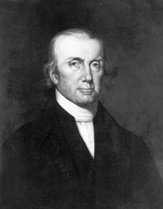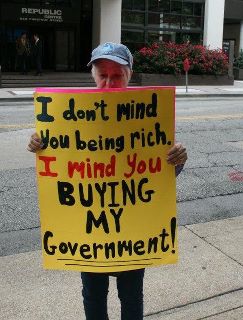 Whether one agrees or disagrees with the premise, the Occupy Wall Street Movement has at the very least, made us all think. It has brought the very concept of social-economics under the scrutiny of the public and identified a clear discrepancy in the way that many Americans view our current financial system. No doubt instigated by the country’s current economic and unemployment debacle, many participants (and observers) of the “Occupy-Movement” are now wondering if a radical change is necessary in order to remedy the country’s fiscal condition.
Whether one agrees or disagrees with the premise, the Occupy Wall Street Movement has at the very least, made us all think. It has brought the very concept of social-economics under the scrutiny of the public and identified a clear discrepancy in the way that many Americans view our current financial system. No doubt instigated by the country’s current economic and unemployment debacle, many participants (and observers) of the “Occupy-Movement” are now wondering if a radical change is necessary in order to remedy the country’s fiscal condition.
One of the most highly debated items at the top of their list is the practice for/against capitalism, the very keystone in the foundation of the country’s economic engine. This argument has split the proponents and critics of OWS further into two groups: those who oppose modern capitalism and those who vow to maintain it. Some folks vehemently believe that the current system is broken, while others feel that it was always destined to fail. Although OWS has splintered off into a variety of “causes,” one of the root beliefs of the movement was the unfair influence that wealthy (aka big business) has over the U.S. Government.
As a historian, I find it fascinating that one of our nation’s earliest politicians and political commentators may have predicted this dilemma well over 200 years ago. John Taylor of Caroline County, Virginia, predicted the problems of modern state capitalism and central banking. Both a successful politician and writer, Taylor served in the VA House of Delegates (1779–81, 1783–85, 1796–1800) and in the U.S. Senate (1792–94, 1803, 1822–24). He is considered by experts to be a Jeffersonian Democrat, although he participated in the Anti-Administration; Democratic Republican; Democratic Republican; and Crawford Republican parties. He also published multiple books on politics and agriculture, some of which have been credited with inspiring the States’ Rights and Libertarian parties.
It must be stated that Taylor was NOT an Anti-Capitalist, nor was he against a Free-Market system. He was however, an adamant critic of the way in which the governing-system could be overly-financed and manipulated by the rich. According to Thorton Miller’s Foreword in the re-released version of Taylor’s 1822 publication Tyranny Unmasked, (ed. F.Thornton Miller (Indianapolis: Liberty Fund, 1992):
A note of explanation is needed for Taylor's use in Tyranny Unmasked of the term “capitalists” to describe his opponents. When he began writing in the 1790s, he was more likely to use the phrase “monied aristocracy” to describe his enemies. Thirty years later, he believed the Constitution, Hamilton, Federalists, and Republican party moderation and compromise had allowed an aristocracy of wealth to rise in America. In America, instead of titled nobles, the lords were financiers. Instead of members of the House of Lords, they were the stockholders of the Bank of the United States. By the writing of Tyranny Unmasked, Taylor was using the more economic-sounding term, “capitalists,” to refer to these aristocrats. But, he was not opposed to capitalism, and he often cited Adam Smith and capitalist economists in his works, including this one. Like Adam Smith, Taylor opposed government intervention in the economy and wanted a natural economy, a free market system. Taylor opposed those capitalists who were not satisfied with natural economics and who sought to benefit through government intervention. He described his opponents more precisely when he used such phrases as “manufacturing capitalists” or “protective duty capitalists.”
There was, however, a major aspect of capitalism that Taylor rejected. He would not condone the potential pluralism of the capitalist, liberal, or free market theory: an America consisting of competing interests. For Taylor, the only good interest was natural and productive, and, in America, where the vast majority were farmers, that was agriculture, which should remain predominant. He was an agrarian first and foremost; he was a capitalist as long as most capital was going into agriculture. He believed there were fundamental principles in economics just as in politics. “Among these principles,” he writes in Tyranny Unmasked, “the most important is, that land is the only, or at least the most permanent source of profit; and its successful cultivation the best encourage of all other occupations, and the best security for national prosperity.”
Taylor “opposed those capitalists who were not satisfied with natural economics and who sought to benefit [themselves] through government intervention.” In other words, these types of capitalists (aka the 1%) could essentially purchase their way into a position of influence over the government, who would in turn, rule in a way that would benefit their own financial interests. Sound familiar? That logic (to me) is pretty simple: Capitalism works, but perhaps not American Capitalism (as it stands) which enables one class of income to unfairly dictate over another. In that regard, perhaps we can gain some new insight by listening to the folks at OWS. We should at least think about it. John Taylor did.
Perhaps this sign best explains this argument:

Updated: Thursday, 3 November 2011 12:02 PM EDT
Permalink | Share This Post





